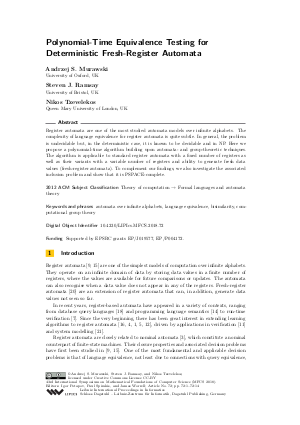Polynomial-Time Equivalence Testing for Deterministic Fresh-Register Automata
Authors Andrzej S. Murawski, Steven J. Ramsay, Nikos Tzevelekos
-
Part of:
Volume:
43rd International Symposium on Mathematical Foundations of Computer Science (MFCS 2018)
Part of: Series: Leibniz International Proceedings in Informatics (LIPIcs)
Part of: Conference: Mathematical Foundations of Computer Science (MFCS) - License:
 Creative Commons Attribution 3.0 Unported license
Creative Commons Attribution 3.0 Unported license
- Publication Date: 2018-08-27
File

PDF
LIPIcs.MFCS.2018.72.pdf
- Filesize: 0.55 MB
- 14 pages
Document Identifiers
Subject Classification
ACM Subject Classification
- Theory of computation → Formal languages and automata theory
Keywords
- automata over infinite alphabets
- language equivalence
- bisimilarity
- computational group theory
Metrics
- Access Statistics
-
Total Accesses (updated on a weekly basis)
0PDF Downloads0Metadata Views
Abstract
Register automata are one of the most studied automata models over infinite alphabets. The complexity of language equivalence for register automata is quite subtle. In general, the problem is undecidable but, in the deterministic case, it is known to be decidable and in NP. Here we propose a polynomial-time algorithm building upon automata- and group-theoretic techniques. The algorithm is applicable to standard register automata with a fixed number of registers as well as their variants with a variable number of registers and ability to generate fresh data values (fresh-register automata). To complement our findings, we also investigate the associated inclusion problem and show that it is PSPACE-complete.
Cite As Get BibTex
Andrzej S. Murawski, Steven J. Ramsay, and Nikos Tzevelekos. Polynomial-Time Equivalence Testing for Deterministic Fresh-Register Automata. In 43rd International Symposium on Mathematical Foundations of Computer Science (MFCS 2018). Leibniz International Proceedings in Informatics (LIPIcs), Volume 117, pp. 72:1-72:14, Schloss Dagstuhl – Leibniz-Zentrum für Informatik (2018)
https://doi.org/10.4230/LIPIcs.MFCS.2018.72
BibTex
@InProceedings{murawski_et_al:LIPIcs.MFCS.2018.72,
author = {Murawski, Andrzej S. and Ramsay, Steven J. and Tzevelekos, Nikos},
title = {{Polynomial-Time Equivalence Testing for Deterministic Fresh-Register Automata}},
booktitle = {43rd International Symposium on Mathematical Foundations of Computer Science (MFCS 2018)},
pages = {72:1--72:14},
series = {Leibniz International Proceedings in Informatics (LIPIcs)},
ISBN = {978-3-95977-086-6},
ISSN = {1868-8969},
year = {2018},
volume = {117},
editor = {Potapov, Igor and Spirakis, Paul and Worrell, James},
publisher = {Schloss Dagstuhl -- Leibniz-Zentrum f{\"u}r Informatik},
address = {Dagstuhl, Germany},
URL = {https://drops.dagstuhl.de/entities/document/10.4230/LIPIcs.MFCS.2018.72},
URN = {urn:nbn:de:0030-drops-96544},
doi = {10.4230/LIPIcs.MFCS.2018.72},
annote = {Keywords: automata over infinite alphabets, language equivalence, bisimilarity, computational group theory}
}
Author Details
Funding
Supported by EPSRC grants EP/J019577, EP/P004172.
References
-
F. Aarts, P. Fiterau-Brostean, H. Kuppens, and F. W. Vaandrager. Learning register automata with fresh value generation. In Proceedings of ICTAC, volume 9399 of Lecture Notes in Computer Science, pages 165-183. Springer, 2015.

-
L. Babai. On the length of subgroup chains in the symmetric group. Communications in Algebra, 14(9):1729-1736, 1986.

-
M. Bojańczyk, B. Klin, and S. Lasota. Automata theory in nominal sets. LMCS, 10(3), 2014.

-
B. Bollig, P. Habermehl, M. Leucker, and B. Monmege. A robust class of data languages and an application to learning. Logical Methods in Computer Science, 10(4), 2014.

-
S. Cassel, F. Howar, B. Jonsson, and B. Steffen. Active learning for extended finite state machines. Formal Asp. Comput., 28(2):233-263, 2016.

-
M. L. Furst, J. E. Hopcroft, and E. M. Luks. Polynomial-time algorithms for permutation groups. In Proceedings of FOCS, pages 36-41. IEEE Computer Society, 1980.

-
R. Grigore, D. Distefano, R. L. Petersen, and N. Tzevelekos. Runtime verification based on register automata. In Proceedings of TACAS, LNCS. Springer, 2013.

-
J. E. Hopcroft and R. M. Karp. A linear algorithm for testing equivalence of finite automata. Technical Report 114, Cornell University, 1971.

-
M. Kaminski and N. Francez. Finite-memory automata. Theor. Comput. Sci., 134(2):329-363, 1994.

-
D. E. Knuth. Efficient representation of perm groups. Combinatorica, 11(1):33-43, 1991.

-
M. Leucker. Learning meets verification. In Proceedings of FMCO, volume 4709 of Lecture Notes in Computer Science, pages 127-151, 2007.

-
J. Moerman, M. Sammartino, A. Silva, B. Klin, and M. Szynwelski. Learning nominal automata. In Proceedings of POPL, pages 613-625. ACM, 2017.

-
A. S. Murawski, S. J. Ramsay, and N. Tzevelekos. Bisimilarity in fresh-register automata. In Proceedings of LICS, pages 156-167, 2015.

-
A. S. Murawski and N. Tzevelekos. Algorithmic nominal game semantics. In Proceedings of ESOP, volume 6602 of Lecture Notes in Computer Science, pages 419-438. Springer-Verlag, 2011.

-
F. Neven, T. Schwentick, and V. Vianu. Finite state machines for strings over infinite alphabets. ACM Trans. Comput. Log., 5(3):403-435, 2004.

-
H. Sakamoto. Studies on the Learnability of Formal Languages via Queries. PhD thesis, Kyushu University, 1998.

-
H. Sakamoto and D. Ikeda. Intractability of decision problems for finite-memory automata. Theor. Comput. Sci., 231(2):297-308, 2000.

-
T. Schwentick. Automata for XML - A survey. J. Comput. Syst. Sci., 73(3):289-315, 2007.

-
N. Tzevelekos. Full abstraction for nominal general references. Logical Methods in Computer Science, 5(3), 2009.

-
N. Tzevelekos. Fresh-register automata. In Proceedings of POPL, pages 295-306. ACM Press, 2011.

-
F. W. Vaandrager. Model learning. Commun. ACM, 60(2):86-95, 2017.

